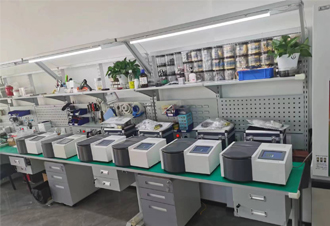 English
English


Exploring the Applications and Techniques of EPC Gas Chromatography in Analytical Chemistry
Understanding EPC Gas Chromatography
Gas chromatography (GC) is an analytical method utilized for separating and analyzing compounds that can be vaporized without decomposition. Among its various applications, it is particularly important in fields such as environmental monitoring, food quality control, and forensic science. One of the key advancements in this area is the development of the EPC (Electronic Pressure Control) technology, which has significantly enhanced the efficiency and accuracy of gas chromatography.
What is EPC?
EPC, or Electronic Pressure Control, refers to the technology used in gas chromatography to maintain a constant pressure of the carrier gas throughout the analysis process. Traditional GC systems rely on mechanical pressure regulators, which can be prone to fluctuations and delays that affect the overall performance and reproducibility of the results. EPC technology addresses these issues by utilizing electronic controls to ensure stable and precise pressure management throughout the entire chromatography process.
The Importance of Pressure Control in GC
In gas chromatography, the carrier gas plays a vital role in the separation of components within a sample. The flow rate and pressure of the carrier gas directly influence the efficiency of the separation process. If the pressure is inconsistent, it can lead to variations in retention times, peak shapes, and overall resolution. Consequently, accurate and reproducible results are essential for reliable analytical outcomes.
EPC systems provide several advantages over traditional methods. By offering rapid adjustments to pressure that can respond in real-time to changing conditions, EPC allows for higher precision in maintaining the necessary flow rates. This is crucial when analyzing complex mixtures where minor differences can have significant impacts on the results.
Benefits of EPC in Gas Chromatography
1. Improved Resolution By maintaining consistent pressure, EPC systems help enhance the separation efficiency between different components in a sample. Improved resolution means that peaks in a chromatogram are better defined, facilitating easier identification and quantification of compounds.
epc gas chromatography

2. Increased Reproducibility One of the main challenges in analytical chemistry is achieving reproducible results. EPC technology minimizes human errors and mechanical inconsistencies, thereby yielding more accurate results across multiple runs. This is essential in quality control settings where the same procedure must yield consistent outputs.
3. Ease of Use Modern EPC systems often come with user-friendly interfaces, allowing operators to set and monitor parameters easily. This ease of operation reduces the training time required for new users and decreases the potential for operational errors.
4. Method Development Flexibility EPC enables faster method development due to its ability to easily change flow rates and pressure settings. Researchers can rapidly optimize conditions to achieve the best performance for each specific analysis, even when working with different sample types.
5. Reduced Maintenance Costs By replacing traditional mechanical pressure controls with electronic systems, EPC setups tend to require less maintenance. This reduction in maintenance translates into lower operational costs over time, making them more appealing for laboratories.
Applications of EPC Gas Chromatography
EPC gas chromatography is widely used across various industries. In environmental testing, it plays a critical role in identifying pollutants in air and water samples. In the food and beverage industry, it ensures the detection of flavor compounds and contaminants, facilitating compliance with health regulations. The pharmaceutical sector also benefits from EPC GC, where precise compound analysis is vital for drug development and quality assurance.
Conclusion
EPC technology represents a significant leap forward in gas chromatography, providing enhanced control over pressure, which in turn improves the precision and accuracy of analyses. As industries continue to prioritize quality and reliability in their analytical results, the adoption of EPC-enabled gas chromatography systems will likely expand. This technology not only streamlines the process of chromatography but also opens up new possibilities for research and development across various fields. In an era where data integrity is paramount, EPC gas chromatography stands out as a key player in the analytical toolkit. With its ability to ensure reproducible results and improve overall efficiency, EPC is a game changer for laboratories around the world.
-
Differences between open cup flash point tester and closed cup flash point testerNewsOct.31,2024
-
The Reliable Load Tap ChangerNewsOct.23,2024
-
The Essential Guide to Hipot TestersNewsOct.23,2024
-
The Digital Insulation TesterNewsOct.23,2024
-
The Best Earth Loop Impedance Tester for SaleNewsOct.23,2024
-
Tan Delta Tester--The Essential Tool for Electrical Insulation TestingNewsOct.23,2024





